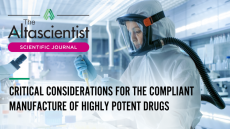Slow Releasing Contraceptive API Led to Janssen's Latest Recall

The company – a subsidiary of Johnson & Johnson (J&J) – told in-Pharmatechnologist.com the voluntary recall affects batches of its contraceptive pill Cilest, equating to 32m boxes throughout 43 countries in Europe, Latin America and Asia. The US was not affected.
Spokesperson for J&J, Michelle Romano, said the problem was caused by the API releasing slower than required by the defined product specification.
The drug is produced at Janssen’s Schaffhausen, Switzerland facility and the issue was discovered during internal tests at the site. Romano said “an internal investigation was immediately launched and is on-going to finalise appropriate corrective actions.”
Containing two hormones that are similar to oestrogen and progesterone produced by the body, Cilest works by preventing eggs from being released from the ovary.
Romano told us “the risk to women is considered to be very low as there is no impact on the safety or efficacy of the product.”
The news is the latest in a number of recalls for J&J. Last week we reported on how 19 lots of its painkiller Tylenol had been recalled from its Brazilian division due to detachment issues with the dispenser in the bottle.
In Korea as well there have been problems with a number of Janssen drugs, including Tylenol - this time the children’s suspension – which contained excessive levels of the (potentially liver damaging) API acetaminophen. The recall was ordered by the South Korean Ministry of Food and Drug Safety (MFDS) and, according the Korean media, could lead to lawsuits and a spell in prison for Janssen Korea’s CEO.
J&J has also recalled products ranging from OTCs to blood glucose level measuring devices for diabetes in the last couple of years.
In-Pharmatechnologist.com posed Romano the question whether this spate of product recalls was just an unlucky coincidence or if there is something inherent in the manufacturing procedures at J&J and its subsidiaries?
“Each year, we produce billions of high-quality products worldwide and ensuring the quality and safety of our companies’ products remains our top priority,” she said. “Even after our products reach the marketplace, we continue to monitor the use, safety and effectiveness of our products across the globe.”


















